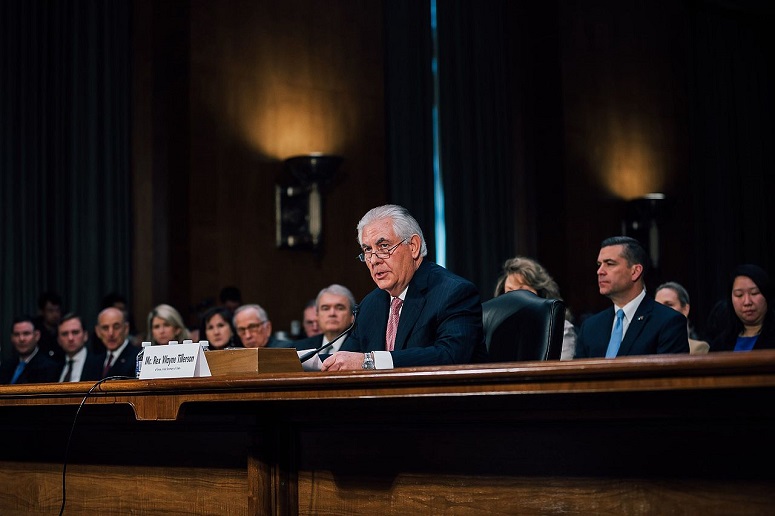
The US Secretary of State Rex Tillerson has stressed that the actions of the Islamic State (IS) group against Christians, Yazidis and Shia Muslims constitute genocide, and also criticised America’s ally, Saudi Arabia, for religious freedom violations.
Tillerson made his “genocide” comments in the preface to the State Department’s annual review of religious freedom. The report surveying 2016, the first published during the presidency of Donald Trump, was released on Tuesday (15 August).
In the report’s preface, Tillerson wrote: “ISIS is clearly responsible for genocide against Yazidis, Christians, and Shia Muslims in areas it controlled. ISIS is also responsible for crimes against humanity and ethnic cleansing directed at these same groups, and in some cases against Sunni Muslims, Kurds, and other minorities.”
The term “genocide” is important because signatories to the UN Convention on Genocide, like the US, are obliged to take steps to protect the victims of genocide and to punish the perpetrators. Tillerson’s predecessor, John Kerry, used the term last year, saying: “In my judgment, Daesh [the Arabic acronym for IS] is responsible for genocide against groups under its control, including Yazidis, Christians and Shia Muslims.”
Speaking at the launch of the report in Washington, Tillerson called on Saudi Arabia specifically to “embrace greater degrees of religious freedom for all of its citizens”. He cited elements, detailed in the report, including criminal penalties for apostasy, atheism, blasphemy, and insulting the Saudi state’s interpretation of Islam, Wahhabism, as well as attacks on Shi’ite Muslims.
The report noted that “freedom of religion is not provided under the law and the government does not recognise the freedom to practice publicly any non-Muslim religion”. It continued: “The Ambassador and other embassy officials continued to raise and discuss reports of abuses and violations of religious freedom.” They also discussed their concerns with non-Sunni, including “citizens who no longer considered themselves Muslims”.
Tillerson also rebuked Turkey, a NATO ally, saying that “authorities continued to limit the human rights of members of some religious minority groups”. US pastor Andrew Brunson has been imprisoned in Turkey since October as a “national security risk”.
Tillerson accused Iran of targeting religious minorities including Baha’is and Christians, and noted that in Sudan, the government arrests and intimidates clergy, and prevents the building of new churches while tearing down existing ones.
The report did not address Trump’s attempt this year to temporarily suspend refugee admissions, nor his decision to impose a lower cap on the number of those admissions, Reuters noted. The report states that resettlement is a “vital tool for providing refugees protection”.
Many refugees admitted to the United States in 2016 were fleeing religious intolerance and persecution, it added.
Lord Alton, the British crossbench peer and religious freedom campaigner, welcomed the report as a “reality check” on the right to believe, not to believe or to change beliefs – a “forgotten, contemptuously disregarded right,” he said.
The US Commission on International Religious Freedom (USCIRF) said that in addition to highlighting countries of particular concern, the report should also have a designation for “entities of particular concern” – non-state actors that wield political influence and use violence to achieve their aims. It called for this designation to be given to IS in Iraq and Syria, the Taliban in Afghanistan, and Al-Shabaab in Somalia.
Meanwhile USCIRF argued for the repeal of all blasphemy legislation in a report issued earlier this week. In ‘Respecting Rights? Measuring the world’s blasphemy laws’, the commission said such legislation existed in 71 nations, but “deviate the most from international human rights principles” in Iran, Pakistan, Yemen, Somalia, and Qatar, where blasphemy laws “aim to protect the state religion of Islam in a way that impermissibly discriminates among different groups”. USCIRF Chairman Daniel Mark said: “Blasphemy laws are wrong in principle, and they often invite abuse and lead to assaults, murders, and mob attacks.”